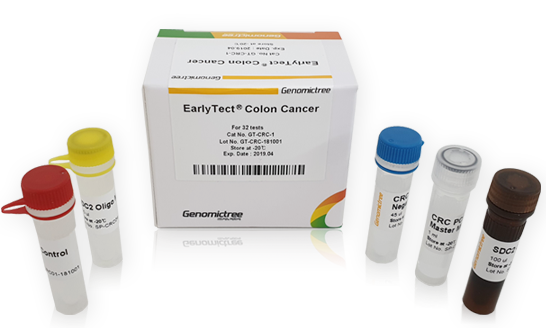Colorectal cancer epigenetic diagnostic kits
Septin9 Epi proColon 2.0 colorectal cancer screening test
Septin9 Epi proColon® 2.0 colorectal cancer screening test
Sensitivity, % 75-81
Specificity, % 91-96
In the European Union only 1 in 7 eligible people is screened for colorectal cancer (CRC). As a consequence, 60% of CRC cases are diagnosed when the cancer has already spread regionally or to distant organs and treatment becomes more challenging.
The Epi proColon® test is a blood-based test designed to aid in the early detection of colorectal cancer.
The epigenetic-based test kit is CE-labeled EU, FDA, and CFDA approved for colorectal cancer screening for average-risk patients (as defined by current screening guidelines) who decline or choose not to be screened by colonoscopy or a stool-based fecal immunochemical test (FIT).
- The Epi proColon® test is not intended for patients defined as having elevated risk for developing CRC based on previous history of colorectal polyps, CRC or related cancers, inflammatory bowel disease (IBD), chronic ulcerative colitis (CUC), Crohn’s disease, familial adenomatous polyposis (FAP).
- Persons at higher risk also include those with a family history of CRC, particularly with two or more first degree relatives with CRC, or one or more first degree relative(s) less than 50 years of age with CRC.
- The Epi proColon® test has not been evaluated in patients who have been diagnosed with a relevant familial (hereditary) cancer syndrome, such as non‐polyposis colorectal cancer (HNPCC or Lynch Syndrome), Peutz-Jeghers Syndrome, MYH-Associated Polyposis (MAP), Gardner’s syndrome, Turcot’s (or Crail’s) syndrome, Cowden’s syndrome, Juvenile Polyposis, Cronkhite-Canada syndrome, Neurofibromatosis, or Familial Hyperplastic Polyposis, or in patients with anorectal bleeding, hematochezia, or with known iron deficiency anemia.
- Patients without a diagnosed CRC but with documented chronic conditions, comorbidity or on medications were tested to determine potential effects on Epi proColon 2.0 CE results. No significant impacts were detected.
- Positive test results have been observed in healthy subjects and in patients diagnosed with chronic gastritis (2 in 17 patients), esophagitis (1 in 8 patients) and non-rheumatoid arthritis (1 in 10 patients), and lung (5 in 15 patients), breast (3 in 23 patients) and prostate (4 in 40 patients) cancers. Positive test results have been found in pregnant women.
- Test results should be ordered and interpreted by a healthcare professional.
0,00 €
incl. VAT and free shipping to selected countries
Free shipping to the following countries: Germany Show more Show less
- Sold Out
Earlytect® syndecan-2 fecal colorectal cancer test
Currently, colonoscopy is the most accurate screening method for early diagnosis of CRC. However, its compliance rate remains very low due to its invasiveness, dietary restriction requirement, and extensive bowel preparation. Although noninvasive fecal immunochemical tests (FIT) for hemoglobin in stool are available, their sensitivities are relatively low in detecting stage I CRC. Thus, developing highly accurate CRC screening method using molecular biomarkers for people who are reluctant to participate in colonoscopy examination is urgently needed for early detection of CRC.
This test is a real-time PCR test that measures methylated syndecan-2 (SDC2) DNA using human fecal. Abnormal methylation of the syndecan-2 biomarker in colorectal cancer tissues is observed more than 95% regardless of the stage and is not observed in normal colorectal tissues. This indicates that the presence of methylated syndecan-2 DNA has a significant association with the incidence of colorectal neoplasia. It has been proven to be able to diagnose colorectal cancer with 90% sensitivity and 90% specificity, and 89% sensitivity for early stages (0-II) in a pivotal trial on 585 subjects.


